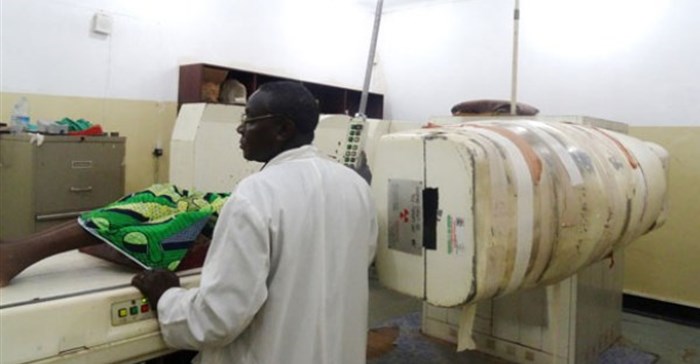How will Uganda drive more cancer patients to hospital?

In fact, the two medical workers at the screening desk often spend the time chitchatting. At about 10am, seeing no single patient, I asked them why there are rarely people screening for cancer.
"People fear cancer results," one said.
But just a few metres away on the opposite treatment side, a sizeable number patients could be seen. Many hurdled in groups, some still wrapped up in their warm clothing, blankets and sheets, often with protruding tumours on the face and others with bold heads probably from tough cancer treatment. A few walked around. Some had been here for days and others weeks, they said, hoping in vain to see a doctor.
Treatment vs screening
Workers at the Institute say the contrast between the screening side and treatment side does not surprise them. Dr Noleb Mugisha, one of the few oncologists at the 50-year-old Institute located at Mulago Hill, says there is a scramble at the treatment clinic because people are in pain.
"They only report after their tumours start paining and that's why we lose them. Any doctor prides in treating to cure but by the time they come here their cancers are irreversible and there's nothing much we can do," he says bare hiding his frustration. Many of his colleagues share his view.
WHO guidelines
It's one problem that experts at the World Health Organisation (WHO) have recognised and want to reverse. So, it released a new set of guidelines to early diagnosis and treatment of cancer aimed at ensuring increased survival.
The country-level intervention guidelines are summarised in three steps; improving public awareness of different cancer symptoms and encourage people to seek care when these arise, investing in strengthening and equipping health services and training health workers so they can conduct accurate and timely diagnostics, and lastly ensuring people living with cancer can access safe and effective treatment, including pain relief, without incurring prohibitive personal or financial hardship.
The guidelines come after the organisation's new figures showed a grim fact that 8,8m of the 14m people diagnosed with cancer globally each year die because their cases are identified at an advanced stage, when they are harder to treat successfully.
Prioritising investment
In Uganda, of the 4,000 cases recorded at the Institute last year, 80% died. The most common cancers were Kaposi's sarcoma, which is common among people living with HIV/Aids, cervical, breast, prostate and cancer of the oesophagus. Most of the newly diagnosed cases were either in second stage or forth stage according to Mugisha.
In its guidelines, WHO throws the ball of reversing the problem trend into the hands of healthcare managers. They recommend that countries; especially middle and low income like Uganda where the problem is greater, need to prioritise investment in diagnostic services that include imaging, laboratory tests, and pathology which are key to helping detect cancers and plan treatment.
Strategies for early diagnosis
Strategies to improve early diagnosis according to the organisation can be readily built into health systems at a low cost. In turn, effective early diagnosis can help detect cancer in patients at an earlier stage, enabling treatment that is generally more effective, less complex, and less expensive. Several studies done in high-income countries have shown this can actually work.
Evidence shows treatment for cancer patients who have been diagnosed early are two to four times less expensive compared to treating those diagnosed with the disease at more advanced stages. And, this does not only reflect in terms of what one pays for medical service but also the fact that one can continue to work and support their families if they access effective treatment in time.
To health minister, Jane Ruth Aceng, reducing the cancer diseases burden in Uganda should not be viewed as the duty of the government only. Instead, each person can take responsibility as more than a third of all cases are preventable with simple lifestyle measures.
She says apart from coming up with good policies, investing in palliative care, and ensuring access to vaccination programmes, there is not a lot that the government can do.
Source: allAfrica

AllAfrica is a voice of, by and about Africa - aggregating, producing and distributing 2000 news and information items daily from over 130 African news organisations and our own reporters to an African and global public. We operate from Cape Town, Dakar, Lagos, Monrovia, Nairobi and Washington DC.
Go to: http://allafrica.com/





















